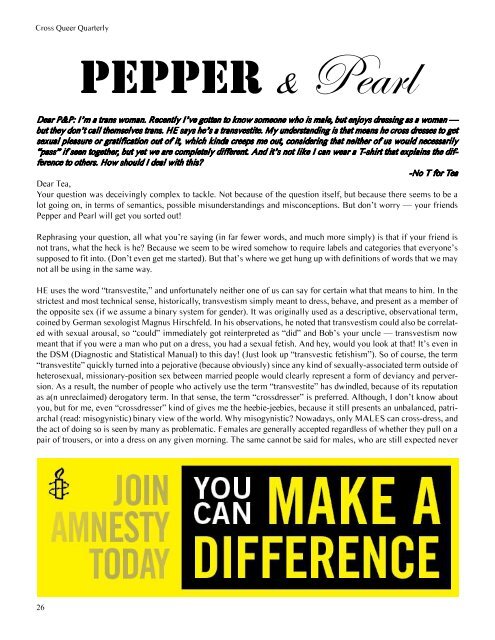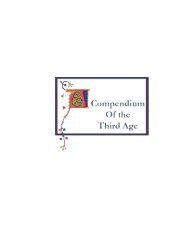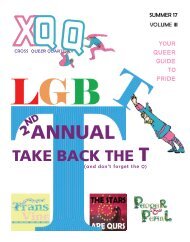XQQ-Pride-edition-Almost-final-Draft
You also want an ePaper? Increase the reach of your titles
YUMPU automatically turns print PDFs into web optimized ePapers that Google loves.
Cross Queer Quarterly<br />
Pepper & Pearl<br />
Dear P&P: I’m a trans woman. Recently I’ve gotten to know someone who is male, but enjoys dressing as a woman —<br />
but they don’t call themselves trans. HE says he’s a transvestite. My understanding is that means he cross dresses to get<br />
sexual pleasure or gratification out of it, which kinda creeps me out, considering that neither of us would necessarily<br />
“pass” if seen together, but yet we are completely different. And it’s not like I can wear a T-shirt that explains the difference<br />
to others. How should I deal with this?<br />
-No T for Tea<br />
Dear Tea,<br />
Your question was deceivingly complex to tackle. Not because of the question itself, but because there seems to be a<br />
lot going on, in terms of semantics, possible misunderstandings and misconceptions. But don’t worry — your friends<br />
Pepper and Pearl will get you sorted out!<br />
Rephrasing your question, all what you’re saying (in far fewer words, and much more simply) is that if your friend is<br />
not trans, what the heck is he? Because we seem to be wired somehow to require labels and categories that everyone’s<br />
supposed to fit into. (Don’t even get me started). But that’s where we get hung up with definitions of words that we may<br />
not all be using in the same way.<br />
HE uses the word “transvestite,” and unfortunately neither one of us can say for certain what that means to him. In the<br />
strictest and most technical sense, historically, transvestism simply meant to dress, behave, and present as a member of<br />
the opposite sex (if we assume a binary system for gender). It was originally used as a descriptive, observational term,<br />
coined by German sexologist Magnus Hirschfeld. In his observations, he noted that transvestism could also be correlated<br />
with sexual arousal, so “could” immediately got reinterpreted as “did” and Bob’s your uncle — transvestism now<br />
meant that if you were a man who put on a dress, you had a sexual fetish. And hey, would you look at that! It’s even in<br />
the DSM (Diagnostic and Statistical Manual) to this day! (Just look up “transvestic fetishism”). So of course, the term<br />
“transvestite” quickly turned into a pejorative (because obviously) since any kind of sexually-associated term outside of<br />
heterosexual, missionary-position sex between married people would clearly represent a form of deviancy and perversion.<br />
As a result, the number of people who actively use the term “transvestite” has dwindled, because of its reputation<br />
as a(n unreclaimed) derogatory term. In that sense, the term “crossdresser” is preferred. Although, I don’t know about<br />
you, but for me, even “crossdresser” kind of gives me the heebie-jeebies, because it still presents an unbalanced, patriarchal<br />
(read: misogynistic) binary view of the world. Why misogynistic? Nowadays, only MALES can cross-dress, and<br />
the act of doing so is seen by many as problematic. Females are generally accepted regardless of whether they pull on a<br />
pair of trousers, or into a dress on any given morning. The same cannot be said for males, who are still expected never<br />
26

















